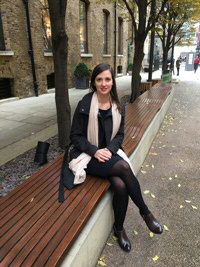Paralegal - Aleksandra Pecyna

My name is Aleksandra Pecyna, I am originally from Poland but I have lived in the UK since 2006. Before studying at the University of Groningen I completed a LLB at the University of Birmingham. I am currently working as an in-house paralegal.
What programme/track did you take in our Faculty? Why did you choose this programme/track?
I studied LLM International Economic and Business Law.
Following my LLB I wanted to continue with my studies, and in particular I wanted to find a programme which would focus on international business law. I looked at various LLMs, in the Netherlands and other EU countries. The programme at the University of Groningen was attractive for a number of reasons. Firstly, the content was varied yet focused. I had an interest in all compulsory modules, and there was more than sufficient choice of elective modules to choose from in addition to those. Secondly, there were varied assessments throughout the year as opposed to just end of the year finals, which I thought would allow me to follow a structured approach to my studies.

Finally, the more practical reasons were the course duration of one year (as opposed to two years in some other countries), and its lower cost than that of similar programmes in the UK. Having now completed the LLM I would definitely do it again, also because I know how nice and helpful the staff at the Faculty of Law are and how great Groningen is as a student city.
What have you done next to your programme? Which extracurricular activities did you participate in?
To start with there were plenty of social activities planned by ESN which helped me settle in and meet people outside of my course and my accommodation. These ranged from nights out to topical trips exploring Groningen’s history and culture. I also stayed in one of the international student houses and we always organised various activities together.
Additionally, I took part in the United Netherlands Public Speaking Programme, which included a series of meetings and exercises to improve our public speaking skills. It was an excellent activity, led by students who took part in international competitions. I also contributed as an editor to the Groningen Journal of International Law, which is a student led journal addressing current legal issues.
What does your current job entail? Which competences are most important to this job?
I work as an in-house paralegal for an IT recruitment and outsourcing company, which is a fast paced and varied role. Alongside two solicitors forming the part of the team I review, negotiate and draft commercial contracts, deal with compliance matters, and answer queries from other teams across the business, as well as external parties. The company operates internationally and has clients both in Poland and in the Netherlands, and my native Polish and basic Dutch I acquired whilst at Groningen often help me with dealing with questions specific to those two jurisdictions. This also proves that legal studies are more about having the legal research and analysis skills than just knowing what the law is – I am often presented with issues I have not come across before, therefore the general skills gained during my studies are of key importance to my day to day job, as it is crucial that I am able to grasp key issues and propose solutions quickly. Additionally, working in a commercial environment I have to be constantly aware of the business context as well as the law, and be able to explain the legal points to my colleagues and clients without a legal background in an accessible manner. Finally, there is a certain aspect of proactivity to my role: I keep up to date with legal developments both in the UK and overseas in order to be able to identify and address any challenges the company might face.
Aleksandra Pecyna is now working as Contracts and Compliance Manager.
How did you end up in this job? What is/was your career path?
After my LLM I took some time off to consider my options. I completed an internship in one of the top law firms in my native Poland before deciding to come back to the UK. I was looking at varied roles before finding my current job, but when I saw the advert I knew it was the one, and I was lucky enough to have been accepted for the position. What I enjoy about working in-house is that I know my function is one of the key ones to the business, it is facilitating commercial relationships, and therefore the company’s growth. Due to the small size of my team there are plenty of opportunities to learn and get involved, and due to the fact that the company is privately owned I am able to make a genuine contribution and put my ideas forward to senior stakeholders.
Next year I plan to commence the Legal Practice Course, which is a prerequisite to becoming a solicitor in the UK. Furthermore, I plan to continue improving my Dutch and my knowledge of other jurisdictions alongside my job and studies.
Do you have any career tips for our students?
It is a good idea to try different things so that you know what interests you, through internships and work experience at university. However, I would say the most important tip is to be creative with your job search. Law firms are widely advertised, especially the bigger ones, but other options should not be overlooked. Working in-house is an excellent choice of profession for those who are also interested in business and commercially-minded. It also exposes you to people who are not lawyers so there are opportunities to make connections with them and learn new skills. Although I found my job in a more traditional way, prospective applications could help, especially if you are targeting a particular sector you are interested in.
| Last modified: | 16 October 2024 3.03 p.m. |
